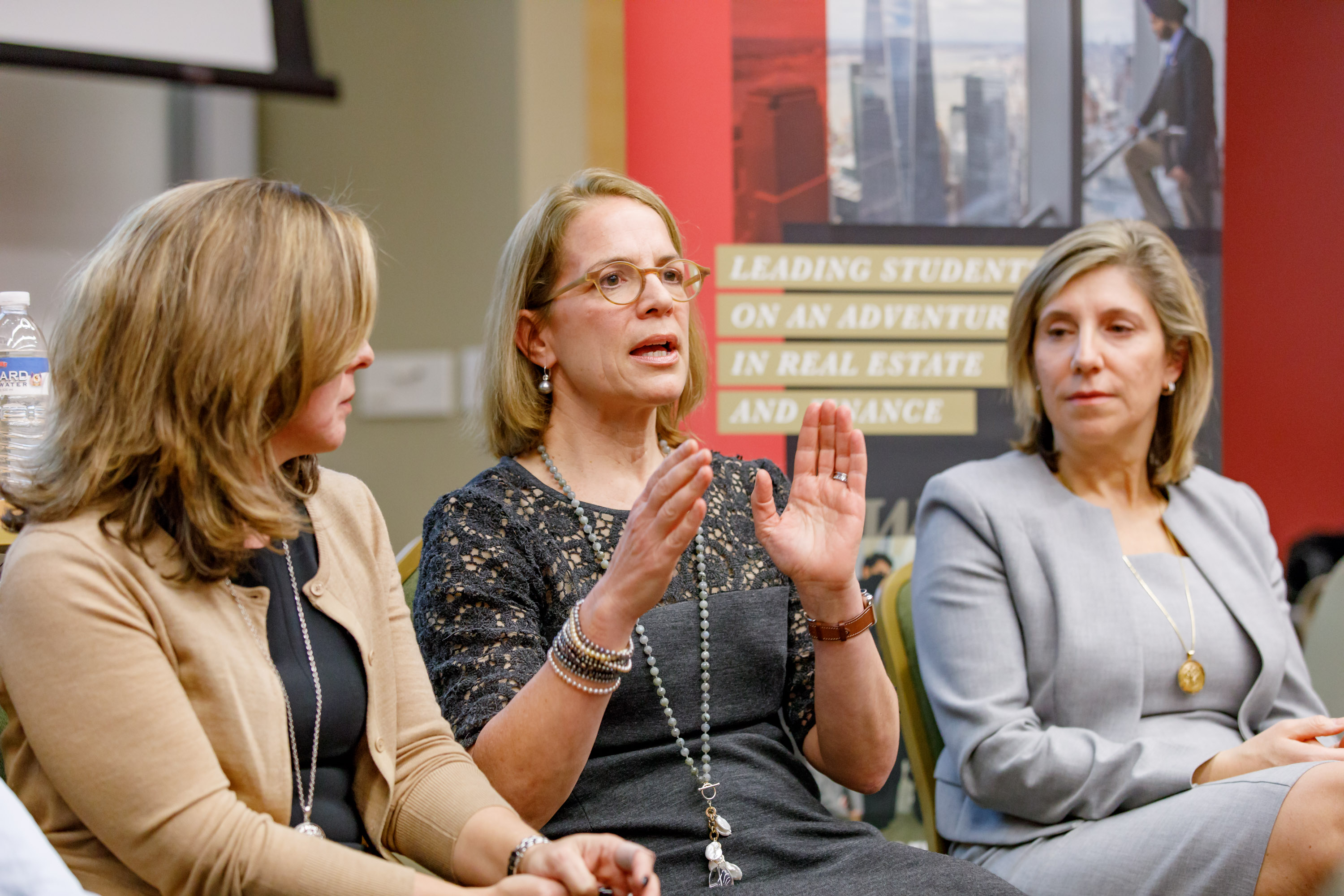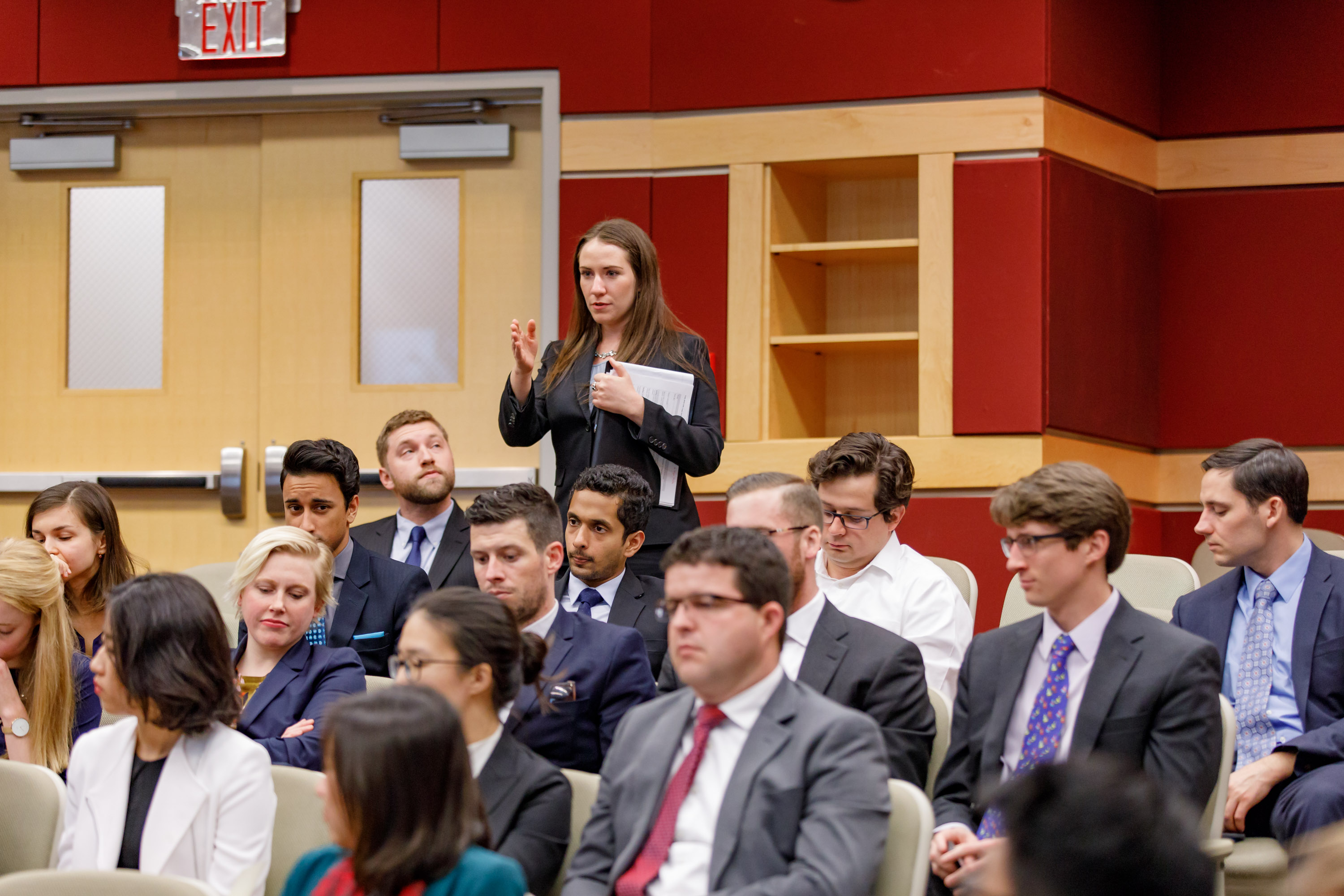The Cornell community warmly welcomed five accomplished female leaders in the real estate industry for the annual WX: New York Women Executives in Real Estate Panel Discussion on Thursday evening, hosted by the Center for Real Estate Finance. Members of Cornell Real Estate Women (CornellREW) assisted in hosting the panelists throughout the day’s activities. A mix of undergraduate and graduate students in real estate, hotel administration, architecture, business, and city planning filled the audience for the panel. Afterward, everyone spilled out into the Statler Park Atrium for a networking reception.
ABOUT THE PANELISTS
You can read previous Real Estate Review Blog posts about Ana Bertuna, Cheryl Boyer, Ellen Brown, Susan Swanezy, and Amy Yao.
Ana Bertuna is Senior Director at Tishman Speyer. Developing 1.5 million square feet of office space in Long Island City, Queens, which is undergoing a huge transformation. Prior to joining Tishman, Bertuna spent 14 years at Related Companies. At the time, bringing an architect onto a development team was a relatively new concept, but Bertuna’s design skills filled a gap in the Time Warner Center mixed-use project team. Despite feeling nervous to jump into the development realm and out of her familiar job as an architect at Skidmore, Owings, and Merrill, Bertuna learned all that she could and soon everything clicked into place. “That’s when I knew where I wanted to be,” she said, remembering how it felt to get comfortable on the development side of things.
Cheryl Boyer, SHA ’87 started in hotel operations after graduating from the School of Hotel Administration and later moved into real estate consulting. She is now the COO at Fulcrum Hospitality. Boyer welcomes outreach from Baker and Hotelie students, many of whom end up in NYC.
Ellen Brown, SHA ’88 is the Executive Vice President of Acquisitions and Development at Denihan. Brown started her career by opening a hotel, but after realizing that job wasn’t for her, she contacted Boyer, an old friend from Cornell, and soon joined her at PwC in advisory services.
Susan Swanezy spent half of her career as a real estate banker with Bankers Trust where she handled mezzanine deals and opportunistic funds. Swanezy has since transitioned to investment management and holds a partner position at Hodes Weill & Associates. “I didn’t have a rolodex of institutional investors,” she recalled, “But I had underwriting experience. That gave me confidence and I knew I could figure it out.” She encouraged students in the audience to get hard skills and hone their craft. “Then there are so many different ways you can go,” she explained. Swanezy plays a major role in Hodes Weill’s annual publication of the Institutional Real Estate Allocations Monitor, a nationally respected document that benchmarks emerging trends in institutional financing. She has worked with every aspect of the real estate industry, from construction and acquisition to REITs, loan workouts, and funds.
As a freshman at Cornell, Amy Yao, SHA ’13 knew she wanted to work in real estate and amassed the technical skills required for many entry-level positions. During her search for internships and eventually full time positions, Yao targeted firms that would allow her to get the most exposure and wouldn’t pigeonhole her into hotel underwriting. She knew she would be able to pivot within the industry with the backing of her strong technical skill set. With this in mind, she accepted a position at Madison International Realty where she worked predominately in underwriting. Now an Analyst at JP Morgan, she has grown into a direct investment role. “I wouldn’t have gotten this job without experience in underwriting,” she noted, citing the need to be able to discuss rental properties with clients using industry speak.
BIG BREAK
 Boyer attributes her “big break” to her experience as an undergraduate in the School of Hotel Administration at Cornell. At the time, courses in the hotel school were more focused on ownership and operations, and she was one of the first pioneers to translate those skills into a career in real estate. Boyer recognized the importance of the operations and asset management side of management and applied those skills to boost team productivity, whether at a hotel or a consultancy. She was able to see early on that good hotels are built on good employees, and understanding those people helped her understand what made the building tick.
Boyer attributes her “big break” to her experience as an undergraduate in the School of Hotel Administration at Cornell. At the time, courses in the hotel school were more focused on ownership and operations, and she was one of the first pioneers to translate those skills into a career in real estate. Boyer recognized the importance of the operations and asset management side of management and applied those skills to boost team productivity, whether at a hotel or a consultancy. She was able to see early on that good hotels are built on good employees, and understanding those people helped her understand what made the building tick.
Bertuna recalled presenting architectural core plans for the Time Warner Center to Related executives while she was an associate at Skidmore, Owings and Merrill. While running through diagrammatic slides, a Related executive pointed out that on one of the floors, the elevators opened straight into a bathroom. Some might consider that an embarrassing moment or snafu for Bertuna, but she was able to think on her feet and describe the software glitch that had caused the mistake. Much to her surprise at the time, she received a job offer from Related that same day. “Whenever you think you’re doing something wrong, you may just be offered a job,” she laughed.
TRENDS IN THE REAL ESTATE INVESTMENT INDUSTRY
Swanezy noted that investment firms have been focusing on operators and smaller funds as opposed to an allocator model. “Investors want niche strategy where the manager has operating expertise and they represent the operator,” she says. Yao contributed a similar perspective, sharing that her job is to create strategies around operators, even though JP Morgan is an allocator. Her team is always searching for institutional investors with operating expertise.
Brown emphasized the importance of taking union labor into consideration when valuing a property. She learned to execute strategies and drive profits while recognizing that collective bargaining affects valuation. She also touched on the amount of unprecedented new supply in the NYC hotel market. When Brown started in the business, there were high barriers to entry for new hotels. “That’s not the case anymore,” she reported. However, she recognized that NYC is a hard market for revenue and union labor, which creates stress in the market. Plus, “new construction financing is tough. Forget it,” she said, suggesting a cloudy outlook from lenders.
Boyer thinks we’re late in the market cycle for hotels, but assets are still eking out growth. The changing political climate has stirred up lots of uncertainty, especially around tax reform and infrastructure investment. Because of this uncertainty, it’s hard to underwrite right now because investment partners want to know what to do with underperforming assets. “There aren’t a lot of great hotel deals on the market right now,” Boyer asserted, signaling concerns about oversupply.
Swanezy also attributed a growing trend in defensive investment strategies to the cloudy political climate, noting that banks have pulled back and private equity firms have come in full force. Niche strategies mitigate risk for investors, including demographic-driven investing (e.g. senior housing) and assets that are less affected by market conditions (e.g. student housing and medical office).
Bertuna also saw some nervousness in the residential market. “Buildings are coming up like mushrooms,” she said, but she is unsure of what will happen with all these residential units coming online. Tishman is still receiving competitive bids, but Bertuna expects that to level out soon.
“If you are a control freak, give it up right now because it doesn’t happen,” Swanezy replied when asked about balancing work and family.
ON BEING A WOMAN IN A MALE-DOMINATED FIELD
Below are a few key pieces of advice the panelists emphasized:
- MOTHERHOOD DOESN’T HAVE TO DERAIL YOUR CAREER
Several panelists acknowledged trying to avoid the “Mommy Track,” and thought companies today make a more concerted effort to establish a work-life-family balance. Boyer shared that she put pressure on herself to avoid taking a long maternity leave because she didn’t want to lose momentum in her career. Swanezy noted that a female coworker was promoted to partner of Hodes Weill just four months after returning from a several month long maternity leave, suggesting that motherhood doesn’t have to disrupt a female’s career trajectory today.
Several panelists also recalled hiding their pregnancies while up for promotions because they didn’t want to be relegated to the Mommy Track. “Better employers acknowledge that the situation is temporary and they have to be flexible if they want to keep those women,” one panelist said. Swanezy also encouraged males in the audience to take paternity leave to break down the stigma around childcare that many working men face.
Bertuna advocated for “mommy communities,” as she put it, where women can job share and split childcare responsibilities. Even though Bertuna was able to work out this type of arrangement for herself, she said she still had a hard time keeping home and work mindsets separate, saying both were always on her mind.
- KNOW YOUR AUDIENCE
Brown recommended that women pay special attention to their audience in the workplace when making requests around gendered issues. Get your work done and ask for what you need, but keep it short. “Less is more,” she said. Boyer agreed with this point and believes that companies are open to work-life balance, but they need to know and trust you as an employee first.
- FIND A SPONSOR
 Swanezy emphasized the importance of having a sponsor who can give you the inside scoop on internal politics and can also advocate for you when bonus time rolls around. Organizations like WX can play a sponsorship role for women who don’t have a sponsor within their work environment or want an outside perspective. “WX is a value-add for this generation,” she suggested. Robert Lathan (MPS RE ’17) asked the panel about how to find the right sponsor. Swanezy recommended looking for rising stars within your company who are getting a lot of business done and are respected by their peers and seniors. Befriend them, ask for more work, and show them you’re willing to try things you haven’t before. Brown agreed, mentioning that it’s valuable to become a go-to person who the company can’t live without. “Be someone they can lean on,” she said. Yao also urged students to keep in touch with past supervisors and keep them updated on your career progress. “Generally people are pretty willing to help,” said Swanezy.
Swanezy emphasized the importance of having a sponsor who can give you the inside scoop on internal politics and can also advocate for you when bonus time rolls around. Organizations like WX can play a sponsorship role for women who don’t have a sponsor within their work environment or want an outside perspective. “WX is a value-add for this generation,” she suggested. Robert Lathan (MPS RE ’17) asked the panel about how to find the right sponsor. Swanezy recommended looking for rising stars within your company who are getting a lot of business done and are respected by their peers and seniors. Befriend them, ask for more work, and show them you’re willing to try things you haven’t before. Brown agreed, mentioning that it’s valuable to become a go-to person who the company can’t live without. “Be someone they can lean on,” she said. Yao also urged students to keep in touch with past supervisors and keep them updated on your career progress. “Generally people are pretty willing to help,” said Swanezy.
- WORK HARD
Referencing her transition from architecture to development, Bertuna advised students in attendance to “grab projects and take ownership of them” through hard work and constant learning. “Do your job, and if you can’t, then leave,” she said firmly.
- NEGOTIATE FIRMLY
Caitlin Elliot (MPS RE & MRP ’17), Founder and President of CornellREW, asked the panel about navigating the double bind that females frequently face in the workplace. Boyer urged audience members to know the landscape. “Know where your line in the sand is for your deal,” she said, encouraging young professionals to set their priorities. Bertuna also suggested that women need to know when to play up their feminine side and when to be firm. “If you show weakness, they know they can take advantage of you and then you’re not taken seriously,” Bertuna contended.
SPONSORING ORGANIZATIONS
The Center for Real Estate Finance at Cornell sponsors rigorous, academic research; disseminates knowledge to practitioners; and provides a forum for the exchange of ideas among professionals, academic community, and students. Students are provided with a number of opportunities to engage with industry leaders through the annual Cornell International Real Estate Case Competition, on-campus speaker series, and panel discussions, like the annual WX Panel.
WX: New York Women Executives in Real Estate is an invitation-only association of executive-level women actively engaged in the commercial real estate industry in New York. WX’s diverse membership includes owners, developers, brokers, architects, engineers, bankers, and lawyers.
Cornell Real Estate Women (CornellREW) is a student organization of female leaders and male supporters in the real estate, business, and city planning programs. The mission of CornellREW is to promote and advance women in real estate throughout the Cornell University community and beyond. CornellREW hosts regular Career Chats with prominent female industry leaders, leads treks to major cities to meet with top real estate companies, and provides a strong support system for women in real estate.



